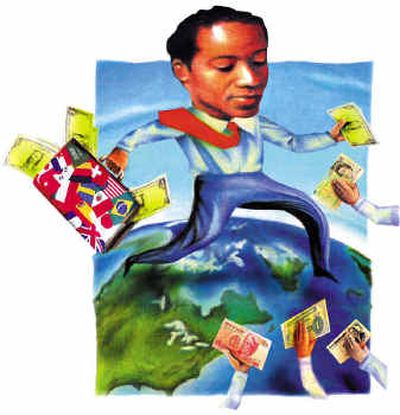Converting Cash

When it comes to traveling this summer, Kris Kistner plans to heed the advice of her mother.
“She tells me to pack half as much and take twice as much money,” says Kistner, a Richardson, Texas, travel agent who’s organizing an overseas trip with her family. “It’s nice to have some extra cash. You never know when you’ll need it.”
But what mode of money is best for Kistner and her husband, Michael, to pack for their two-week golf excursion to Ireland and Scotland: Cash? Traveler’s checks? What about an ATM, debit or credit card?
Financial systems abroad are varied and unpredictable, so there’s no best way to exchange money for overseas travel, experts say. Indeed, you shouldn’t rely exclusively on one method.
Here are some tips to make sure you get the most bang for your buck.
First, there’s no need to obsess over making sure you get the best exchange rate, says Edward Hasbrouck, author of “The Practical Nomad: How to Travel Around the World.”
“You’re on vacation. You want to have fun,” Hasbrouck says. “Knowing what the costs are can help you make intelligent decisions.”
Rates vary depending on where you go. Shop around a little if you don’t like the first rate you’re quoted. And the first exchange bureau you see in the airport or the kiosk in your hotel usually isn’t the best place.
“What you pay for is convenience,” Hasbrouck says. “The more convenient, usually the higher the fee.”
The exchange rate published in the newspaper is typically the interbank or wholesale rate used for electronic transactions involving hundreds of thousands or millions of dollars.
You’ll never get this rate for cash, traveler’s checks, credit or debit cards, or ATM transactions, Hasbrouck says.
You can expect to pay 1 percent to 3 percent more than the wholesale exchange rate for credit, debit or ATM transactions, plus any transaction fees from your bank or credit card company. Cash and traveler’s check conversions usually charge a minimum of about 4 percent to 5 percent wholesale.
Travelers should consider carrying a credit, debit or ATM card. All are widely accepted.
Most cards have protections like emergency card replacement or emergency cash within a day of the request.
Some even will help you replace your passport if it’s lost or stolen.
It is smart to inform your credit card company of your travel plans, says Visa USA Inc. spokeswoman Randa Ghnaim.
Many companies have started tracking abnormal use activity to help prevent fraud and identity theft.
For example, if Kistner doesn’t call her credit card company and all of a sudden it’s being used to make purchases in Dublin rather than Dallas, her transactions could be denied.
ATM withdrawals are generally the easiest and cheapest way to get money while traveling. With a single transaction, you can receive local currency pulled directly from your dollar-denomination bank account at home.
But it’s best to check your bank’s rules for foreign-currency ATM withdrawals before you leave.
“The last thing you want is to be slammed with a bunch of transaction fees,” Hasbrouck says.
And you can’t always count on ATMs being available. For that reason, debit cards can actually be more versatile than ATM cards.
You can use a debit card to purchase items from stores. And in case you run across a malfunctioning ATM, debit cards issued by Visa or MasterCard can be used for over-the-counter cash advances (usually with a fee) at banks that accept those credit cards. Be aware, though, that some foreign ATMs transmit only the first four digits of the PIN. If your PIN is longer, you won’t be able to withdraw money.
For those who want to go the paper route, traveler’s checks function almost like cash but are replaceable if lost or stolen. That cash-like experience costs, though.
Banks typically charge an issue fee, usually 1 percent to 2 percent of the total traveler’s check amount. And when it comes time for you to change your traveler’s checks, look at the fees and rates.
“When you travel, it’s best to bring a mix of cash, traveler’s checks and plastic,” Hasbrouck says. “You don’t have to use it all, but at least you will have it.”